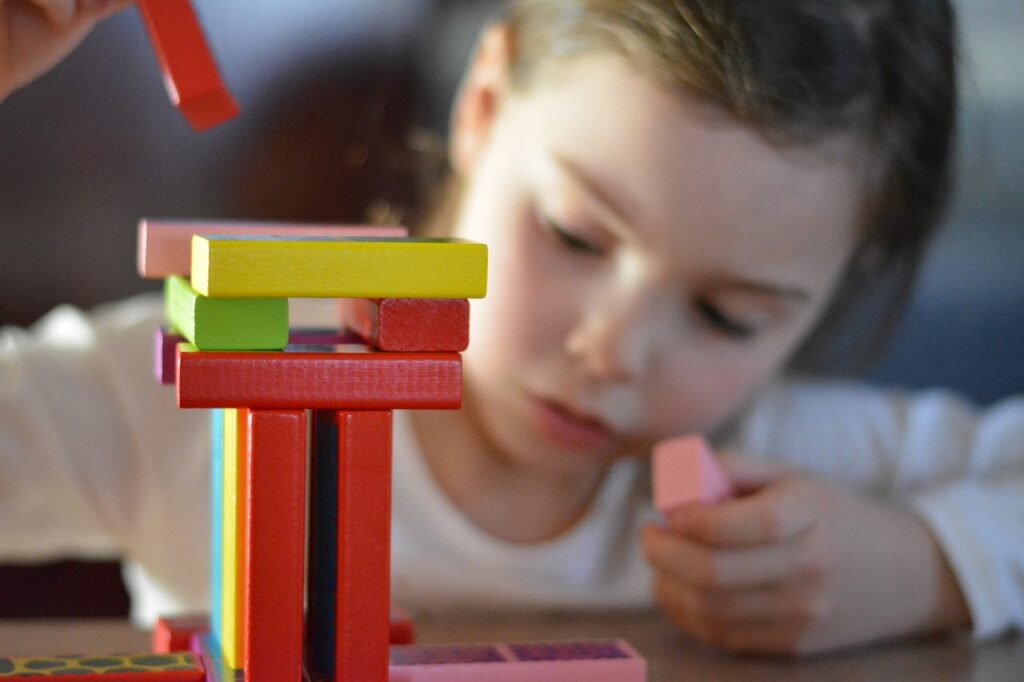To guide our children effectively in developing focus, we can tap into their favorite games and activities.

Many of us parents notice that our kids can be easily distracted, especially in today’s world brimming with diverse information. Figuring out how to improve their focus becomes a challenge for many of us.
For kids under 3
For toddlers, their attention span is limited due to brain development, and their motor skills are still developing. So, when they hit a stumbling block, it’s crucial for us to step in, ensuring they don’t give up too quickly on the activity.
- Building blocks: Little ones have less dexterous fingers, so they really need to concentrate to stack blocks without them toppling over. Using bigger blocks can make it easier for them.
- Clapping game: We clap once, and then our child claps once; we clap twice, they follow suit. This helps train their listening skills.
- Following commands: Ask the child to touch parts of their body as directed, like their head, knees, or toes. This not only tests their listening skills but also helps them identify their body parts.
- Mirror game: Our kids try to mimic our actions just like they’re looking in a mirror.
- Toy hunt: Hide 1 or 2 of their favorite toys around the house for them to find. This requires them to think about where they haven’t looked yet, ensuring they stay focused.
Kids between 3 to 6
From the ages of 3 to 4, our children’s neural cells rapidly grow, it’s an essential time to nurture their concentration. At this stage, children have better control over their focus, and their physical movements and cognitive abilities are also maturing. So, during playtime, we can let them take the lead, setting the pace and rules of the game. If they face challenges, it’s better to wait for them to ask for help rather than jumping in too quickly and interrupting the child’s attention.
Since preschoolers have strong likes and dislikes and weaker self-control, it’s best to nurture their focus through games they love. Games that match their interests and abilities are the most effective.
- “Head, shoulders, knees, and toes”: Our children touch different parts of their body as instructed.
- “London Bridge Is Falling Down”: It’s fun to see if they notice when the bridge is “falling” and they should quickly pass under it. Other games like “Red Light, Green Light” or “Duck, Duck, Goose” can also be used.
- Catching a ball: As we throw the ball to our child, they need to track its path and adjust their arms to catch it. If they’re not fully engaged, they might miss or get hit. Bouncing the ball before passing it can make it easier for them to catch.
- “Stop” game: Kids can wander around the park or house, but once they hear the command “stop” (or any cute signal we decide on), they need to freeze.
- Daily tasks that require attention: For example, at the grocery store, we can ask our child to find specific items, or even compare prices.
- Sing-along games: Like “Old MacDonald had a Farm,” where they need to identify and make the sounds of the animals in the lyrics.
- “Mother says”: Like the game “Simon says,” but with a twist. They only follow commands when they start with “Mother says.”
- Opposite game: If we say “big,” they say “small.” This game helps them think and enriches their vocabulary.
- Memory games: Matching card games, for example, help boost their memory and concentration.
- Puzzles: Here, our kids need to think, plan, and focus to fit pieces together.
- Music training: Learning and playing instruments can boost their focus and benefit cognitive development.
- Interactive storybooks: Ask them to point out characters and scenes to ensure they’re actively listening.
- Meditation practice: Simple exercises like deep breathing or basic meditation can help them concentrate and de-stress.
Takeaways
In our modern, information-rich world, it’s essential to nurture our children’s focus. Through various activities, such as clapping, singing, puzzles, and meditation, we can effortlessly cultivate their attention in daily life. This also deepens our bond with them. With dedication and the right approach, I truly believe all our kids have the potential to develop exceptional concentration skills.